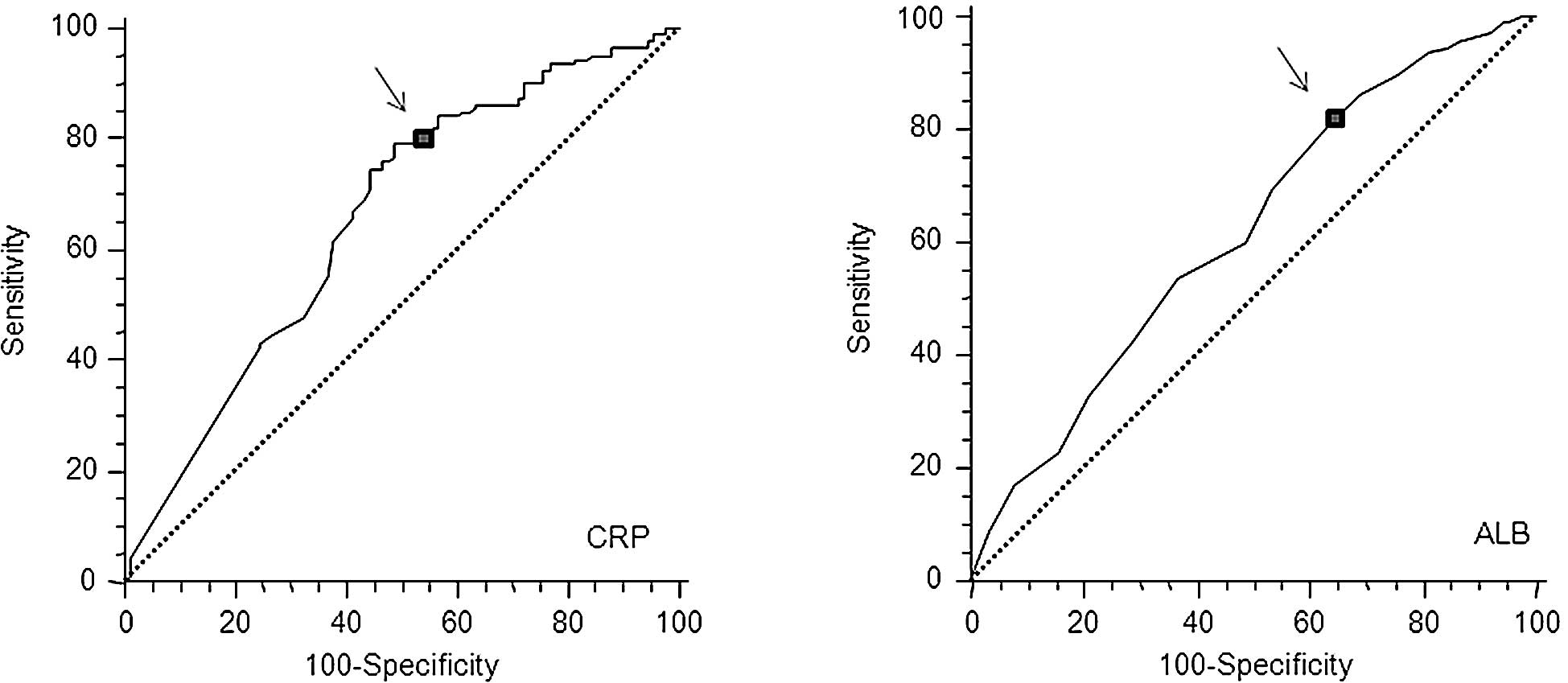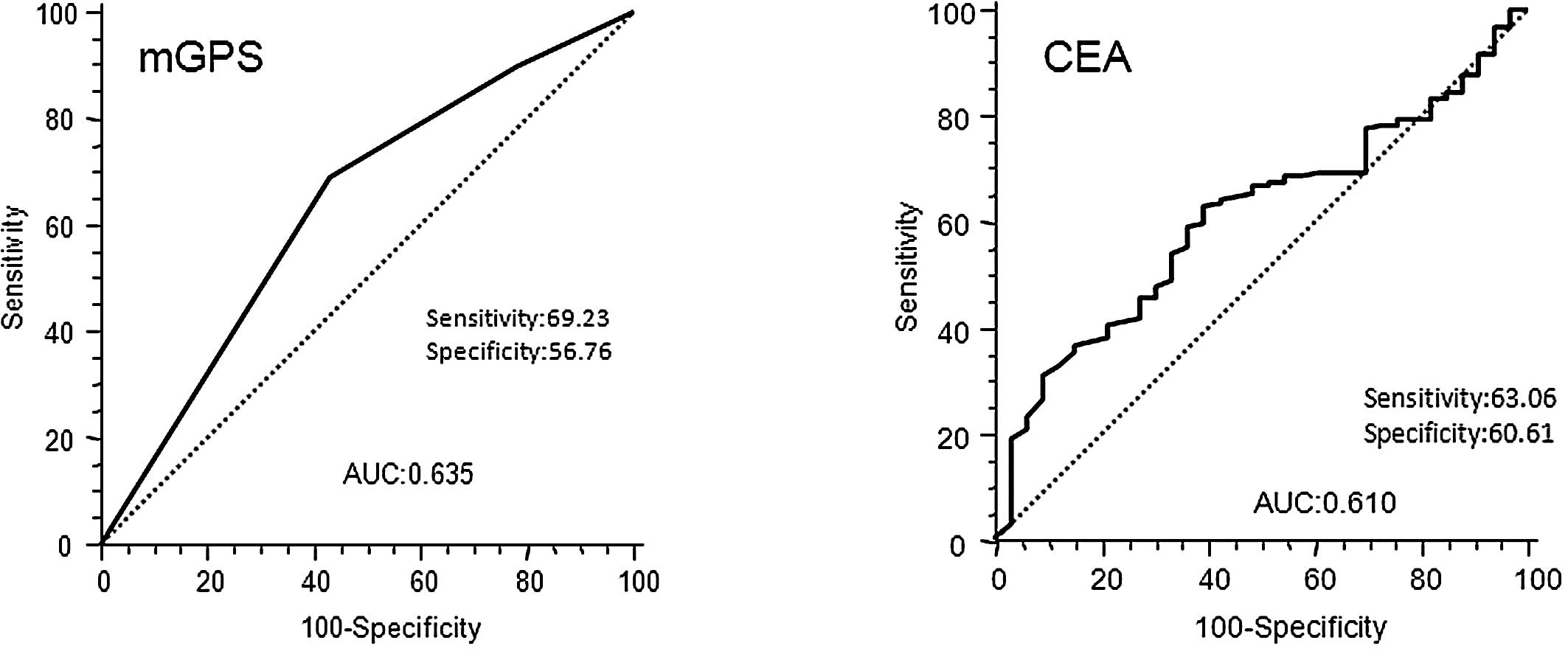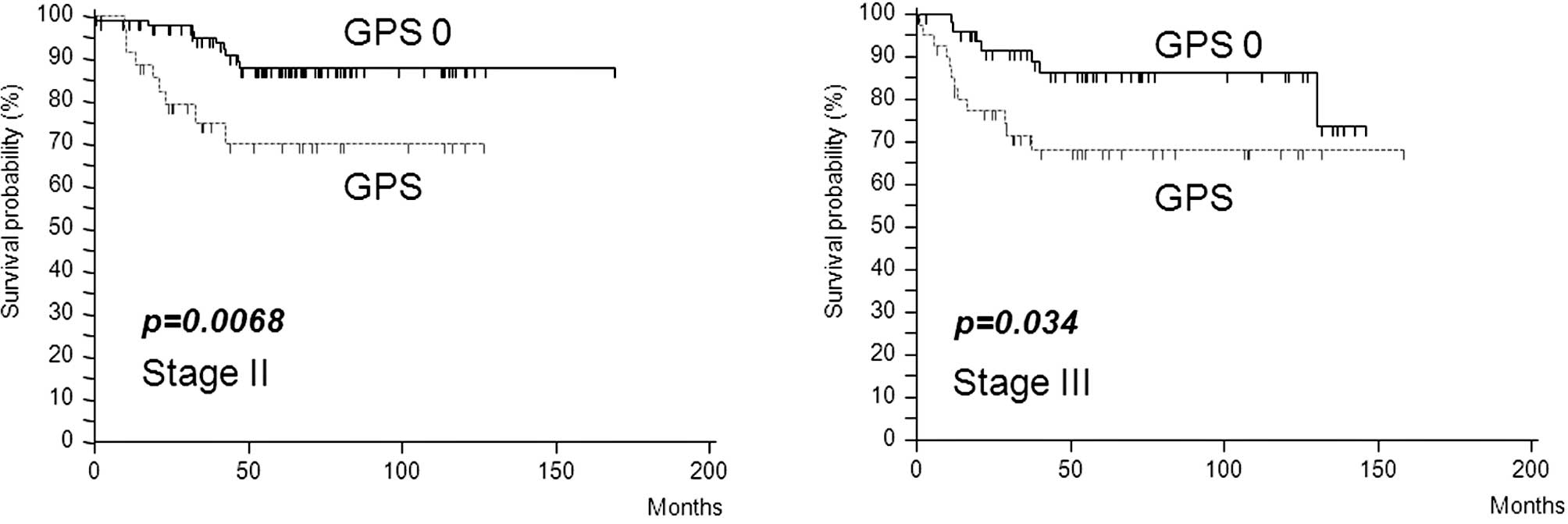|
1.
|
Haller DG: An overview of adjuvant therapy
for colorectal cancer. Eur J Cancer. 31A:1255–1263. 1995.
View Article : Google Scholar : PubMed/NCBI
|
|
2.
|
Wein A, Hahn EG, Merkel S and Hohenberger
W: Adjuvant chemotherapy for stage II colon cancer. Eur J Surg
Oncol. 26:730–732. 2000. View Article : Google Scholar : PubMed/NCBI
|
|
3.
|
Figueredo A, Charette ML, Maroun J,
Brouwers MC and Zuraw L: Adjuvant therapy for stage II colon
cancer: a systematic review from the Cancer Care Ontario Program in
evidence-based care’s gastrointestinal cancer disease site group. J
Clin Oncol. 22:3395–3407. 2004.
|
|
4.
|
Gill S, Loprinzi CL, Sargent DJ, et al:
Pooled analysis of fluorouracil-based adjuvant therapy for stage II
and III colon cancer: Who benefits and by how much? J Clin Oncol.
22:1797–1806. 2004. View Article : Google Scholar : PubMed/NCBI
|
|
5.
|
Canna K, McMillan DC, McKee RF, McNicol
AM, Horgan PG and McArdle CS: Evaluation of a cumulative prognostic
score based on the systemic inflammatory response in patients
undergoing potentially curative surgery for colorectal cancer. Br J
Cancer. 90:1707–1709. 2004.
|
|
6.
|
Nozoe T, Matsumata T, Kitamura M and
Sugimachi K: Significance of preoperative elevation in serum
C-reactive protein as an indicator for prognosis in colorectal
cancer. Am J Surg. 176:335–338. 1998. View Article : Google Scholar : PubMed/NCBI
|
|
7.
|
McMillan DC, Canna K and McArdle CS:
Systemic inflammatory response predicts survival following curative
resection for colorectal cancer. Br J Surg. 90:215–219. 2003.
View Article : Google Scholar : PubMed/NCBI
|
|
8.
|
Crozier JE, McKee RF, McArdle CS, et al:
The presence of a systemic inflammatory response predicts poorer
survival in patients receiving adjuvant 5-FU chemotherapy following
potentially curative resection for colorectal cancer. Br J Cancer.
94:1833–1836. 2006. View Article : Google Scholar
|
|
9.
|
McMillan DC, Wotherspoon HA, Fearon KC,
Sturgeon C, Cooke TG and McArdle CS: A prospective study of tumor
recurrence and the acute-phase response after apparently curative
colorectal cancer surgery. Am J Surg. 170:319–322. 1995. View Article : Google Scholar
|
|
10.
|
Nozoe T, Matsumata T and Sugimachi K:
Preoperative elevation of serum C-reactive protein is related to
impaired immunity in patients with colorectal cancer. Am J Clin
Oncol. 23:263–266. 2000. View Article : Google Scholar : PubMed/NCBI
|
|
11.
|
Gunter MJ, Stolzenberg-Solomon R, Cross
AJ, et al: A prospective study of serum C-reactive protein and
colorectal cancer risk in men. Cancer Res. 66:2483–2487. 2006.
View Article : Google Scholar : PubMed/NCBI
|
|
12.
|
Miki C, Konishi N, Ojima E, Hatada T,
Inoue Y and Kusunoki M: C-reactive protein as a prognostic variable
that reflects uncontrolled up-regulation of the IL-1-IL-6 network
system in colorectal carcinoma. Dig Dis Sci. 49:970–976. 2004.
View Article : Google Scholar : PubMed/NCBI
|
|
13.
|
Koike Y, Miki C, Okugawa Y, et al:
Preoperative C-reactive protein as a prognostic and therapeutic
marker for colorectal cancer. J Surg Oncol. 98:540–544. 2008.
View Article : Google Scholar : PubMed/NCBI
|
|
14.
|
Kawano M, Hirano T, Matsuda T, et al:
Autocrine generation and requirement of BSF-2/IL-6 for human
multiple myelomas. Nature. 332:83–85. 1988. View Article : Google Scholar : PubMed/NCBI
|
|
15.
|
Longo WE, Virgo KS, Johnson FE, et al:
Outcome after proctectomy for rectal cancer in Department of
Veterans Affairs Hospitals: a report from the National Surgical
Quality Improvement Program. Ann Surg. 228:64–70. 1998. View Article : Google Scholar
|
|
16.
|
Heys SD, Walker LG, Deehan DJ and Eremin
OE: Serum albumin: a prognostic indicator in patients with
colorectal cancer. J R Coll Surg Edinb. 43:163–168. 1998.PubMed/NCBI
|
|
17.
|
Longo WE, Virgo KS, Johnson FE, et al:
Risk factors for morbidity and mortality after colectomy for colon
cancer. Dis Colon Rectum. 43:83–91. 2000. View Article : Google Scholar : PubMed/NCBI
|
|
18.
|
Forrest LM, McMillan DC, McArdle CS,
Angerson WJ and Dunlop DJ: Evaluation of cumulative prognostic
scores based on the systemic inflammatory response in patients with
inoperable non-small-cell lung cancer. Br J Cancer. 89:1028–1030.
2003. View Article : Google Scholar : PubMed/NCBI
|
|
19.
|
Forrest LM, McMillan DC, McArdle CS,
Angerson WJ, Dagg K and Scott HR: A prospective longitudinal study
of performance status, an inflammation-based score (GPS) and
survival in patients with inoperable non-small-cell lung cancer. Br
J Cancer. 92:1834–1836. 2005. View Article : Google Scholar : PubMed/NCBI
|
|
20.
|
Al Murri AM, Bartlett JM, Canney PA,
Doughty JC, Wilson C and McMillan DC: Evaluation of an
inflammation-based prognostic score (GPS) in patients with
metastatic breast cancer. Br J Cancer. 94:227–230. 2006.PubMed/NCBI
|
|
21.
|
Crumley AB, McMillan DC, McKernan M,
McDonald AC and Stuart RC: Evaluation of an inflammation-based
prognostic score in patients with inoperable gastro-oesophageal
cancer. Br J Cancer. 94:637–641. 2006.PubMed/NCBI
|
|
22.
|
Glen P, Jamieson NB, McMillan DC, Carter
R, Imrie CW and McKay CJ: Evaluation of an inflammation-based
prognostic score in patients with inoperable pancreatic cancer.
Pancreatology. 6:450–453. 2006. View Article : Google Scholar : PubMed/NCBI
|
|
23.
|
Ishizuka M, Nagata H, Takagi K, Horie T
and Kubota K: Inflammation-based prognostic score is a novel
predictor of postoperative outcome in patients with colorectal
cancer. Ann Surg. 246:1047–1051. 2007. View Article : Google Scholar : PubMed/NCBI
|
|
24.
|
Roxburgh CS, Crozier JE, Maxwell F, et al:
Comparison of tumour-based (Petersen Index) and inflammation-based
(Glasgow Prognostic Score) scoring systems in patients undergoing
curative resection for colon cancer. Br J Cancer. 100:701–706.
2009. View Article : Google Scholar
|
|
25.
|
Wiggers T, Arends JW, Schutte B, Volovics
L and Bosman FT: A multivariate analysis of pathologic prognostic
indicators in large bowel cancer. Cancer. 61:386–395. 1988.
View Article : Google Scholar : PubMed/NCBI
|
|
26.
|
Fletcher RH: Carcinoembryonic antigen. Ann
Int Med. 104:66–73. 1986. View Article : Google Scholar
|
|
27.
|
Moertel CG, Fleming TR, Macdonald JS,
Haller DG, Laurie JA and Tangen C: An evaluation of the
carcinoembryonic antigen (CEA) test for monitoring patients with
resected colon cancer. JAMA. 270:943–947. 1993. View Article : Google Scholar : PubMed/NCBI
|
|
28.
|
Tepper JE, O’Connell MJ, Niedzwiecki D, et
al: Impact of number of nodes retrieved on outcome in patients with
rectal cancer. J Clin Oncol. 19:157–163. 2001.PubMed/NCBI
|
|
29.
|
Joseph NE, Sigurdson ER, Hanlon AL, et al:
Accuracy of determining nodal negativity in colorectal cancer on
the basis of the number of nodes retrieved on resection. Ann Surg
Oncol. 10:213–218. 2003. View Article : Google Scholar : PubMed/NCBI
|
|
30.
|
Joseph NE, Sigurdson ER, Hanlon AL, et al:
Colon cancer survival is associated with increasing number of lymph
nodes analyzed: A secondary survey of intergroup trial INT-0089. J
Clin Oncol. 21:2912–2919. 2003. View Article : Google Scholar : PubMed/NCBI
|
|
31.
|
Swanson RS, Compton CC, Stewart AK and
Bland KI: The prognosis of T3N0 colon cancer is dependent on the
number of lymph nodes examined. Ann Surg Oncol. 10:65–71. 2003.
View Article : Google Scholar : PubMed/NCBI
|
|
32.
|
Nakazaki H: Preoperative and postoperative
cytokines in patients with cancer. Cancer. 70:709–713. 1992.
View Article : Google Scholar : PubMed/NCBI
|
|
33.
|
Wakuda R, Miki C and Kusunoki M:
Autoreactivity against interleukin 6 as a risk factor in elderly
patients with colorectal carcinoma. Arch Surg. 136:1274–1279. 2001.
View Article : Google Scholar : PubMed/NCBI
|
|
34.
|
Kinoshita T, Ito H and Miki C: Serum
interleukin-6 level reflects the tumor proliferative activity in
patients with colorectal carcinoma. Cancer. 85:2526–2531. 1999.
View Article : Google Scholar : PubMed/NCBI
|
|
35.
|
Miki C, Inoue Y, Toiyama Y, et al:
Deficiency in systemic interleukin-1 receptor antagonist production
as an operative risk factor in malnourished elderly patients with
colorectal carcinoma. Crit Care Med. 33:177–180. 2005. View Article : Google Scholar : PubMed/NCBI
|
|
36.
|
Hatada T and Miki C: Nutritional status
and postoperative cytokine reponse in colorectal cancer patients.
Cytokine. 12:1331–1336. 2000. View Article : Google Scholar : PubMed/NCBI
|
|
37.
|
Jones SA, Novick D, Horiuchi S, Yamamoto
N, Szalai AJ and Fuller GM: C-reactive protein: a physiological
activator of interleukin 6 receptor shedding. J Exp Med.
189:599–604. 1999. View Article : Google Scholar : PubMed/NCBI
|



















